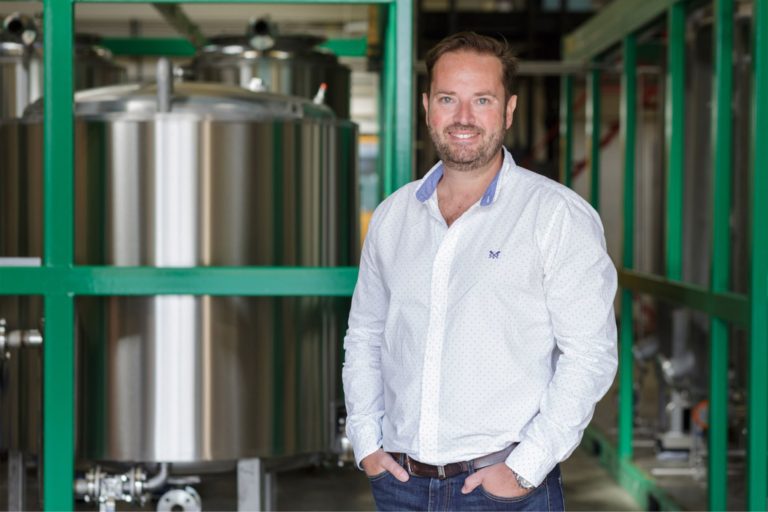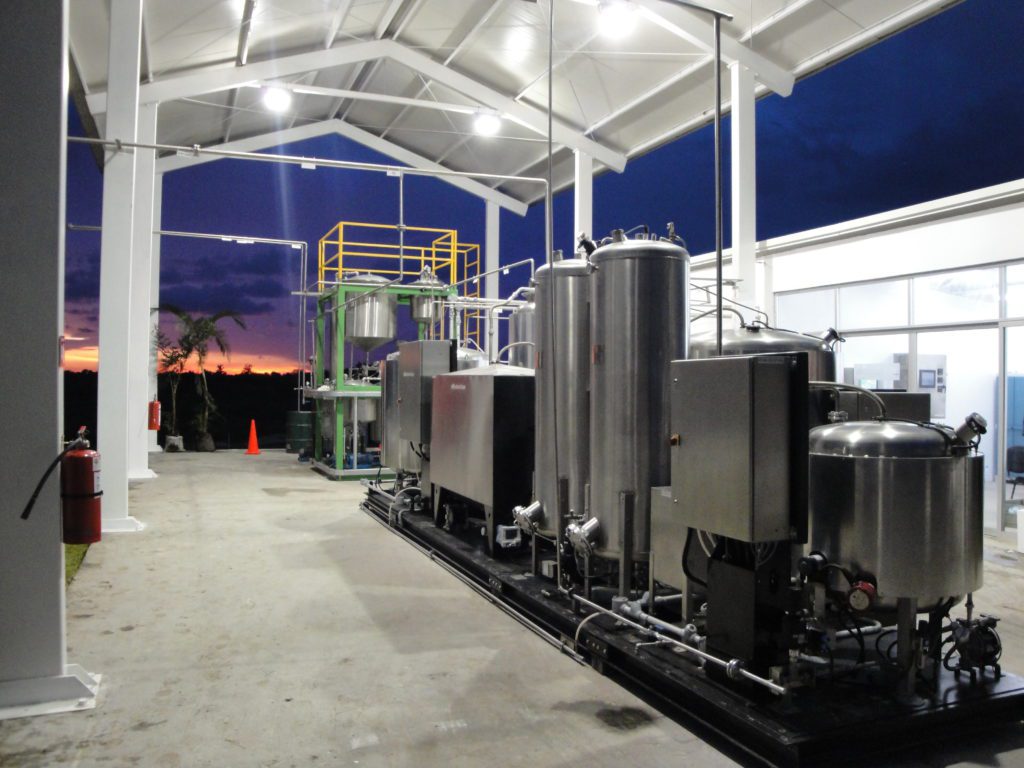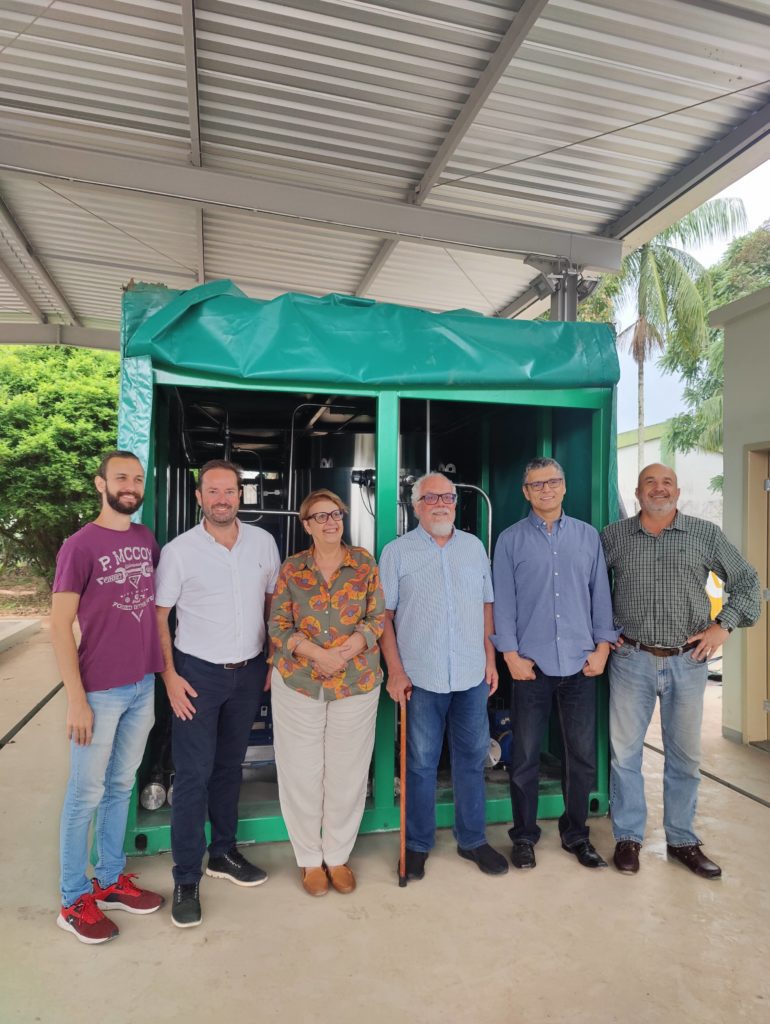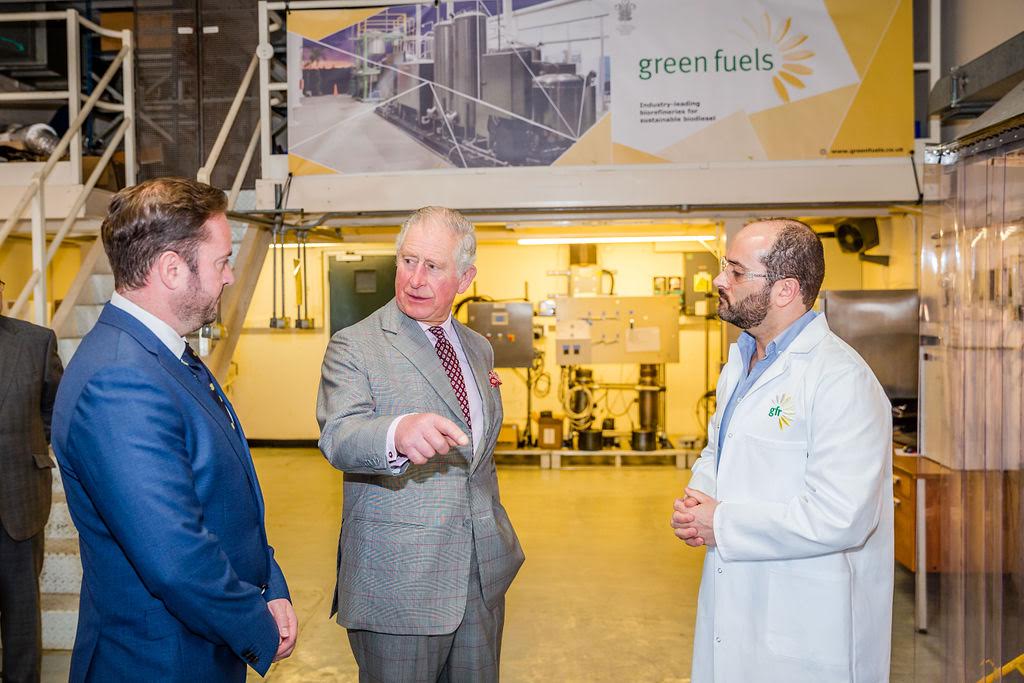
Claudia Weeks, content editor for Fuel Oil News, met with James Hygate, CEO, for a chat about the business and plans for future fuel.
The fight against climate change
Green Fuels has a clear objective: “We are engaged in the fight against climate change. We aim to have a disproportionate impact on greenhouse gas reduction through the projects we operate, the technologies we develop and the equipment that we sell, without harm to the environment.”

The company was founded in 2003 by James Hygate, who explains the background of the business: “We started Green Fuels twenty years ago. I grew up in Stroud, Gloucestershire, an area known for its green credentials. My father, Colin Hygate, was involved in waste management and both my parents were passionate about the environment; they had a big influence on my future career.
“At university I studied zoology, and we did a topic on climate change. Afterwards, I thought ‘bloody hell – we are screwed’, and this was back in the 90s! I was keen to do something to make a positive change and could see that using fossil fuels was something that couldn’t be sustained in the long term. I decided to start making fuel for my own car which then led to me starting the business.
“I learned that you could make biodiesel out of waste cooking oil and so I started making it into fuel and filling my car. It even made the local news in Stroud that a lunatic was making fuel in his garage, and it went on from there!”
Business growth and development
“I can’t believe it’s been twenty years since the business began. In the UK, we’ve now got 20 employees and, globally, it’s probably about 50 employees overall. We’re a small company but we are growing rapidly.”
James went on to discuss how the business has expanded over the years: “We started primarily in the UK selling small scale waste cooking oil and biodiesel equipment. We had a period where we exported a lot: we have exported equipment to about 90 countries so far.
“We have had a big impact on reducing carbon; we’ve probably saved about 7 million tonnes of carbon through our customers so far. We’ve sold the equipment and then our customers have reduced their carbon output. That was our plan initially rather than running our own plants because that was lower risk, but now we have decided to run our own facilities in key markets with long term off-takes. With the plants we are running, we sell fuel every day.
“We’ve got plants operating all over the world and, more recently, we’ve started to build our own facilities to produce fuel in markets where there are key drivers for biofuels. We have a business in India; we’re currently building a new factory there. We’ve got a collaborative project in Juiz de For a, Brazil, just in-land from Rio, where we are demonstrating the viability of local production from waste.
We’ve got a joint venture in Oman producing fuel for local sales and the European market. But, for us, India is the biggest opportunity. We are passionate about being there and we are looking to grow our business there hugely.”
India
James shared more of his thoughts on India and why the country’s ambitious plans for future fuel make it such an exciting place to be:
“India was relatively late to the table with regards to biofuels but has been quick to catch up. Recently a policy has been put in place that mandates a 5% blend which equates to about a 5 billion litre requirement. (In Europe we have 7% in all our diesel.)
“India has also banned the export of its used cooking oil (UCO). UCO from all over the world currently seems to go to Europe which doesn’t really make sense. India’s ban means its UCO must be used internally which means that, rather than using imported palm oil from Indonesia to meet the blend mandate, it will now be met by recycling oil internally. I can’t fault the policies India has put in place; it’s exactly what’s right to stimulate the local market.
“I find my trips to India fascinating. I go a few times a year and have been doing so for the last 10-15 years. The change and shift of focus towards renewables has been remarkable. There is still a lot of heavy industry and coal-fired power stations in India, but you are seeing the shift to renewables and it’s happening at a scale that is much faster-paced than here.
“We have an off-take agreement for more fuel that we can ever produce. It’s allowing us to get preferential financing to build out the plants and all these things allow the industry to happen, and to happen quickly. For biodiesel, India is our number one country of focus with the most opportunity for growth.”
Research and development
“We’ve always been involved in research and development so made the decision to start a separate research company in 2013 to develop and commercialise new ways to produce sustainable fuels. We do a lot of research and want to focus on what makes the biggest impact.

“There have been a variety of projects we’ve worked on over the last few years, including looking at utilising different waste materials – from fish waste to bagasse waste, which is the by-product of the sugar cane industry and can be converted to fuel.
“This business has developed from building plastic tanks and bits of pipes in my dad’s garage to building complex processes and doing an incredible amount of challenging research.”
The sewage sludge discovery – hydrothermal liquefaction
“We’ve commercialised a few of the projects we’ve worked on but the biggest, and most exciting, project for us is a process we’ve developed to convert wet wastes, such as sewage sludge, into a liquid biofuel. We have now set up a separate company to commercialise this process “Firefly Green Fuels”. “The sewage sludge discovery is a process called hydrothermal liquefaction. It’s relatively low energy compared with other routes as you don’t have to remove all the water. You put it under high pressure and the water becomes reactive. When we started looking at it in detail and doing the sums, we were incredibly excited!
“Utility companies are struggling with what to do with the waste as sewage sludge is now being banned from being spread on land. There’s little value to it so doing this could add value which potentially facilitates the improvement of the treatment works. The knock-on effect is incredibly positive.

“There is a lot of sewage waste readily available – 57 million tonnes in the UK alone – and each country obviously produces its own waste ready to use. We have the intellectual property in progress, and we have built some really good relationships with stake holders over the last couple of years for this project.
In 2021 we received £1.9 million in funding from the UK Government through the Green Fuels – Green Skies (GFGS) initiative which has enabled us to scale up the process and test the fuel.”
James’ enthusiasm for this process was obvious: “It’s incredibly exciting! There is nothing to say this can’t be done, there are no red flags on a large scale. It’s amazing to make something from a true waste. A lot of waste that has a potential energy value is already being utilised. With sewage sludge, it’s at the end of its treatment process; it has no value. In the UK, from the material that’s available, we can make 380 million litres of fuel.”
Feedstocks for biofuel
Providing feedstocks for biofuel is becoming more of a challenge. It’s important for businesses to ensure that the provenance is truthful and not creating other environmental issues. Claudia asked James for his opinion on this subject: “We are members of the Roundtable on Sustainable Biomaterials (RSB), which is a global membership organisation that drives the just and sustainable transition to a bio-based and circular economy.
“People have great ideas for amazing solutions to producing fuel, but they must consider the potential knock-on effects. For example, making biofuels out of African palm. If you look at it on a per-hectare production basis, it’s incredibly efficient but the problem is, it’s typically grown on areas that used to be primary rainforests. If it’s done sustainably, that’s great but, often, it isn’t.
“We need to focus on those waste materials that are by-products from other processes or things that can use renewable energies. We do need a multi-approach to all these things – we are talking about producing 300-400 million litres of jet fuel from sewage but that’s a drop in the ocean compared to the usage that’s required. You need everybody’s solution to be successful in one way or another.”
HVO
With the focus of many in the fuel oil industry on HVO as a future liquid fuel James observed: “HVO is great and is a part of the solution.
However, the problem with HVO and biodiesel is that they are all using the same feed sources, so they are competing which is driving prices up. Basically, used cooking oil in the UK is being fully utilised so any increase in HVO will be based on imported oils coming from China or Southeast Asia which aren’t always a true waste. In the aviation industry, they’ve capped the use of HEFA because of that availability of oil. In saying that, it’s obviously better to use HVO than fossil fuel. It’s finding the right renewable for the right box.”
The demand for biofuels
“We are seeing the biggest demand for biofuels in aviation because aviation is something you really cannot decarbonise in any other way.
Short-haul flights could be supported with hydrogen or electric but for long-haul flight hydrogen takes up too much space and with electrification, batteries are too heavy so you can’t do long distances. There is also a big demand in marine. Biofuels make sense for aviation and marine.”
Claudia asked James what will make the difference to mass adoption of biofuels to which he responded: “Basically, if you fill up your petrol or diesel car at the station now, 7% of that fuel is biofuel. It is already being used; it is already adopted. In aviation and other routes, it’s going to be achieved by targets and mandates, but cost is also a factor.”
Working for King Charles
Green Fuels was awarded a Royal Warrant of Appointment to HRH the Prince of Wales in 2013, and we asked James to tell us more about this exciting development: “We started supplying HRH in 2007; we supplied biofuel for the royal train and his personal cars. Most famously, we’ve supplied biofuel for his favourite Aston Martin which he still drives around in.

“We used waste wine and waste cheese to fuel the car! The waste wine was wine that wasn’t suitable for consumption, so we distilled the alcohol out of it, and we worked closely with Aston Martin to convert it and run it on bioethanol.
“The first 100% biofuel-powered train was the Royal Train. Prince Charles wanted the train to run on a 100% biodiesel which it did, and it worked perfectly. It did a whole tour of the country.
“King Charles has been to visit Green Fuels and I’ve had the honour of meeting him a few times. He’s passionate and knowledgeable about renewables. He was in our labs, talking to our chemists about the processes involved, and it was evident how much of an in-depth knowledge he has.”
Solving a really, really big problem
James’ passion and enthusiasm for the whole industry is impressive and comes across clearly when asked what he enjoys most about operating in future fuels: “I love the whole idea of fixing things and problem solving in general and this is solving a really, really big problem! And that’s what keeps me and the team excited – it’s a seriously big problem and we’re trying to have an impact in fixing it. That’s the driver for the business!
The future for Green Fuels
“At the moment, we’re still a relatively small business, but I’m hoping, with the seeds that we are sowing now, in the UK and globally, we can grow into a very large and impactful business.
“There is a lot of innovation. We’re playing a small part around biofuels but in the whole renewables industry, there’s loads of cool stuff coming out over the next few years so I’m hopeful that change is happening now.
“The environment is right for this sort of business to grow. 10 years ago, it was still very much in the periphery, now it’s much more mainstream, and these are solutions that can make a very big difference. We’ve done the groundwork; I can see a pathway that leads to a business of a significant scale. We’re in the fight against climate change. That’s what has driven the business so far. I am proud of what I do, this has never felt like a proper job.”
With plans for growth and development and a clear strategy for forging the path to net zero there is a bright future ahead for Green Fuels. Fuel Oil News looks forward to catching up with James and the Green Fuels team again in the future.


